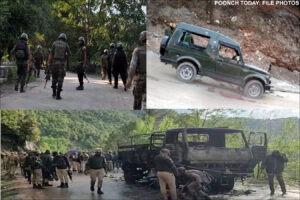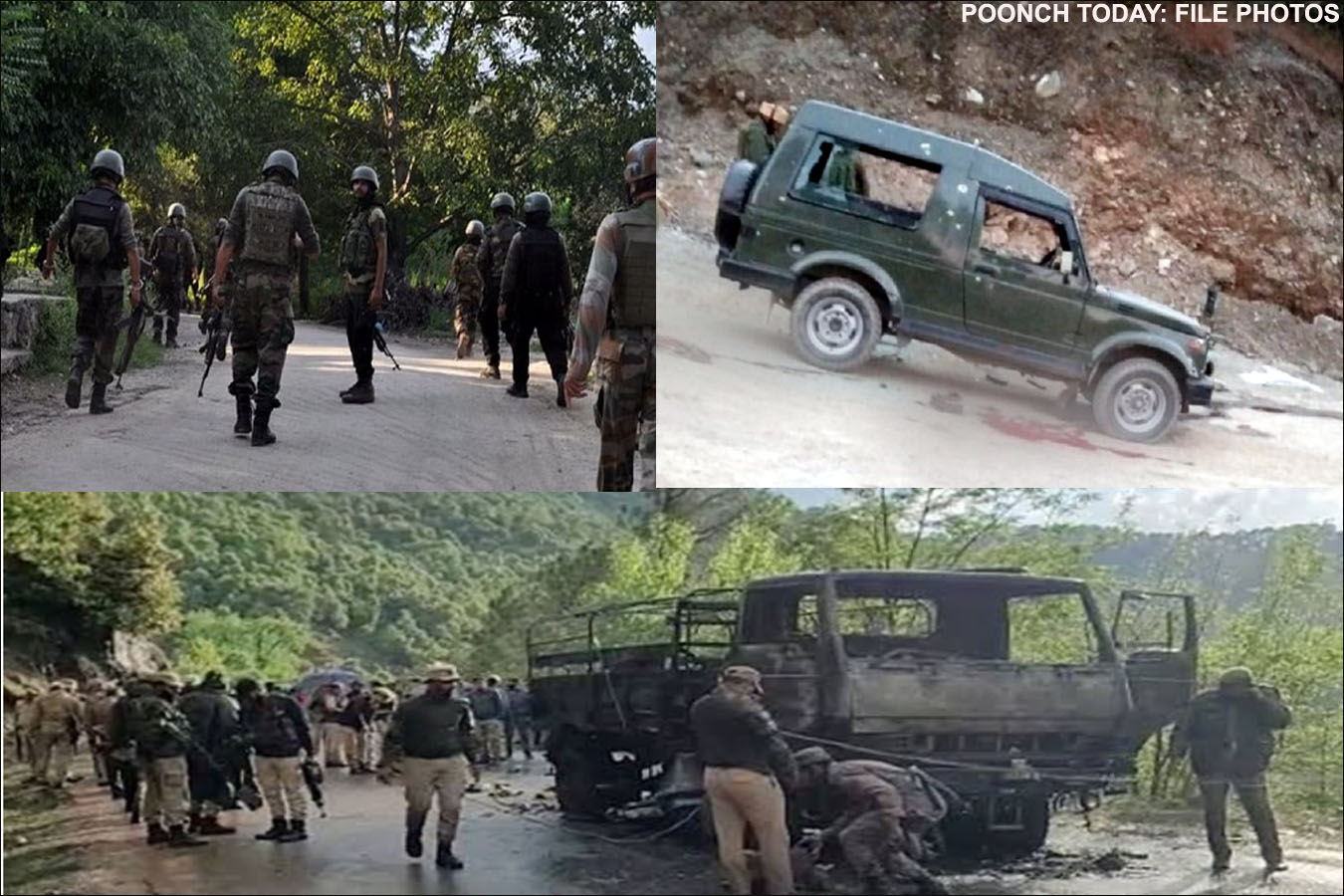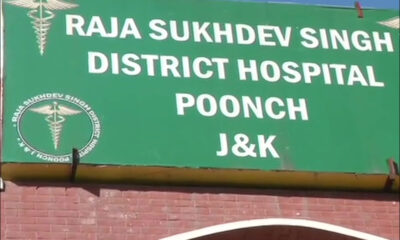Jammu
Lack of professional policing in the Rajouri-Poonch range is a big internal security concern Part-III, Unsolved terror cases raise eyebrows on the top brass; Strong coordination is required between security agencies
Lack of professional policing in the Rajouri-Poonch range is a big internal security concern Part-III, Unsolved terror cases raise eyebrows on the top brass; Strong coordination is required between security agencies
SALIL RAINA
(POONCH TODAY NEWS)
POONCH/RAJOURI: Although not solving the big terrorist attacks from Dhangri, BG to DKG in the Poonch-Rajouri region is not a good sign for the reputation of J&K police and other security agencies, the delay in bringing to book those responsible for disturbing peace in the region has lowered the confidence of the common man in the region.
 To increase the confidence of the people in the security setup, all the security agencies have to formulate a high-level strategy to wreak havoc over the anti-national ecosystem in the region that reportedly has supported the terror network for years. On the other hand, during recent times, some police officers in the R-P range misused their official positions by indulging in unprofessional illegal income generation activities. They even surrendered before powerful entities known for their questionable credentials against the nation, and this shows that the law of the land is for people having no backing, and while those having a strong back, the law cannot take them to task for their wrong acts against society and the nation. Ignoring powerful people with weak credentials against the nation while targeting innocent people has become the main mantra of some police officers, and this has reduced the majesty of the country’s elite force in the eyes of the common man in the Poonch-Rajouri region, and the onus of this weak approach lies on the top brass of police in the twin border districts. Important chairs require strong officers and not those who believe in time-pass culture. There is maximum proof that many people, including some big names, were involved in hawala funding in the Jammu region to support terrorist activities silently, but they have not been taken to task yet. The entire terror ecosystem is working silently, and this gives security agencies a tough time. A former intelligence chief also said repeatedly that alone in the Poonch-Rajouri belt, there are a large number of OGWs and other terror support structures that promote anti-India ideology. What to call similar terror assets in other parts of J&K? A number of important forces within the government were also seen supporting this ecosystem silently. Moreover, some non-professional people in the fourth estate have also become a part of this conspiracy by supporting this anti-national brigade by tactfully running narratives for the ecosystem. Earlier, security forces were able to get information about terrorists and their support structures, but in recent years, it was seen that security forces were finding it hard to get sufficient inputs, which led to less strong coordination between different wings of the security agencies. All the major terrorist attacks in the Poonch-Rajouri belt during the last few years, which were not taken to their logical conclusion, are really a cause for big public concern, and it has shattered the confidence of nationalist people in the region; that’s why people have raised a big question mark on the important chairs of police, including the then DIG and the then SSPs in the R-P range. Those who were responsible for different terrorist attacks from Dhangri, BG-I, and BG-II to DKG are still not traceable, and this shows that the coordination between different security and intelligence agencies remained weak. Terrorists used to come occasionally, and after hitting their targets, they used to flee away by taking shelter in dense forest cover. The dense forest cover in Poonch and Rajouri districts is seen as a big stumbling block for security forces to act heavily against terrorists. The way a number of attacks were carried out in the Rajouri-Poonch belt, the support of local OGWs was not ruled out, as without local support, terrorists could not plan their operations successfully, said a source close to intelligence agencies. The people of the twin border districts of Rajouri and Poonch have been waiting for the last few years to witness performance-oriented results against the revival of terrorism in the region, but the lack of results from the police has put everybody on tenterhooks. The then DIG R-P range, the then SSPs were unable to show the existence of police on the ground during the revival of terrorism in the region. It is pertinent to mention here that Poonch police still have not solved the Shri Dashnami Akhara blast case, which took place on August 13, 2016, in which fifteen people were injured, most of them pilgrims of the Shri Budha Amarnath Yatra. It’s a professional failure that, even after more than eight years, Poonch police officials have failed to crack the Shri Dashnami Akhara blast case. What to call about solving the BG-I, BG-II, and DKG terrorist attacks, the Degwar poster incident, and the Surankote temple blast case that are still haunting the intelligence network of Poonch police? Moreover, no inquiry has yet been started to find out on what basis a number of FIRs on some sensitive crimes against the nation were cancelled during the last few years, under different types of influences. Recently a SPO posted in DPL Poonch was arrested by Miran Sahib police for his involvement in narco-terrorism, and this raised a big internal security concern for the Poonch police that its officials are also involved in anti-national acts. However, war against terrorism and drug fronts can be achieved only if the government places professionally strong police officers in important positions, including the operational front with intelligence-gathering and action-oriented capabilities, strengthening the intelligence grid in a robust way, and ensuring better coordination between police, army, and intelligence agencies, which seems to be missing these days. The almost weak operational front in the region is a cause of big concern for the common man. As of now, the entire Rajouri-Poonch region lacks a strong team of police officers, who have failed to solve all the big terrorist attacks in the region in addition to forming a high-level strategy against drug terrorism. But some officers have been working on their own agenda, which has the capacity to further demolish the integrity of police in the eyes of the common man, because the majority of police officers give the least interest in addressing the genuine day-to-day problems of the common man, which are under the domain of the police. Moreover, hectic attempts were going on to disrupt the peace in the region, especially in the Poonch city with the involvement of antisocial elements, but the local intelligence agencies of police have not taken these emerging threats into notice, and it clearly shows something bad is cooking in the pot of forces inimical to peace, and it’s a wakeup call for the police as the spark neglected burns the entire house. Some forces inimical to peace, which were involved in questionable acts, were also seen pressuring the top brass of police not to take action against them, and to some extent, they succeeded in their pressure tactics due to weak policing in the region. Reportedly, some high-ranked officers of the administration remained part and parcel of different conspiracies to settle their scores with their professional competitors; as a result, many decisions were taken with malafide intentions and partial mindsets that have the power to disturb the peace in the district to the fullest. The involvement of high-ranked officers in sowing the seeds of abhorrence for their personal benefits and under a hidden agenda is really a cause of big concern, but the biggest surprise is that they were adjusted in good positions by the government, rather than facing the music for their ill intentions. However, from an internal security point of view, the entire Rajouri-Poonch region required strong officers if the government was keen to witness major breakthroughs on terrorism, drugs, and other anti-national fronts. The tears of an ailing mother who lost her children in the Dhangri attack and the supreme sacrifice of the soldiers of the Indian Army who attained martyrdom in big terrorist attacks in the Poonch-Rajouri region need not go in vain due to the visibly less professional approach of police, army, and intelligence agencies in the region. The then DIG R-P Range, the then SSPs of twin border districts, and their subordinate officers never showed any promising results in dealing with all the challenges related to the revival of terrorism in the R-P range; as a result, the public confidence in the security system shattered a lot. Moreover, no attempts were made to strengthen the police-public relations for years because public issues were never addressed by the police properly; rather, acts of misuse of powers by some police officers against innocents came into the media limelight off and on. Will the incumbent DIG R-P range, SSPs of twin border districts, top army officials, and intelligence agencies under the leadership of the new DGP of J&K Police, Nalin Prabhat (IPS), form a high-level strategy for the future in a well-coordinated manner to solve all the major terrorist attacks in the R-P range and to deal with all emerging security challenges from an internal security point of view in addition to bringing to book those directly or indirectly involved in hatching a conspiracy against the nation? Only time will tell.
To increase the confidence of the people in the security setup, all the security agencies have to formulate a high-level strategy to wreak havoc over the anti-national ecosystem in the region that reportedly has supported the terror network for years. On the other hand, during recent times, some police officers in the R-P range misused their official positions by indulging in unprofessional illegal income generation activities. They even surrendered before powerful entities known for their questionable credentials against the nation, and this shows that the law of the land is for people having no backing, and while those having a strong back, the law cannot take them to task for their wrong acts against society and the nation. Ignoring powerful people with weak credentials against the nation while targeting innocent people has become the main mantra of some police officers, and this has reduced the majesty of the country’s elite force in the eyes of the common man in the Poonch-Rajouri region, and the onus of this weak approach lies on the top brass of police in the twin border districts. Important chairs require strong officers and not those who believe in time-pass culture. There is maximum proof that many people, including some big names, were involved in hawala funding in the Jammu region to support terrorist activities silently, but they have not been taken to task yet. The entire terror ecosystem is working silently, and this gives security agencies a tough time. A former intelligence chief also said repeatedly that alone in the Poonch-Rajouri belt, there are a large number of OGWs and other terror support structures that promote anti-India ideology. What to call similar terror assets in other parts of J&K? A number of important forces within the government were also seen supporting this ecosystem silently. Moreover, some non-professional people in the fourth estate have also become a part of this conspiracy by supporting this anti-national brigade by tactfully running narratives for the ecosystem. Earlier, security forces were able to get information about terrorists and their support structures, but in recent years, it was seen that security forces were finding it hard to get sufficient inputs, which led to less strong coordination between different wings of the security agencies. All the major terrorist attacks in the Poonch-Rajouri belt during the last few years, which were not taken to their logical conclusion, are really a cause for big public concern, and it has shattered the confidence of nationalist people in the region; that’s why people have raised a big question mark on the important chairs of police, including the then DIG and the then SSPs in the R-P range. Those who were responsible for different terrorist attacks from Dhangri, BG-I, and BG-II to DKG are still not traceable, and this shows that the coordination between different security and intelligence agencies remained weak. Terrorists used to come occasionally, and after hitting their targets, they used to flee away by taking shelter in dense forest cover. The dense forest cover in Poonch and Rajouri districts is seen as a big stumbling block for security forces to act heavily against terrorists. The way a number of attacks were carried out in the Rajouri-Poonch belt, the support of local OGWs was not ruled out, as without local support, terrorists could not plan their operations successfully, said a source close to intelligence agencies. The people of the twin border districts of Rajouri and Poonch have been waiting for the last few years to witness performance-oriented results against the revival of terrorism in the region, but the lack of results from the police has put everybody on tenterhooks. The then DIG R-P range, the then SSPs were unable to show the existence of police on the ground during the revival of terrorism in the region. It is pertinent to mention here that Poonch police still have not solved the Shri Dashnami Akhara blast case, which took place on August 13, 2016, in which fifteen people were injured, most of them pilgrims of the Shri Budha Amarnath Yatra. It’s a professional failure that, even after more than eight years, Poonch police officials have failed to crack the Shri Dashnami Akhara blast case. What to call about solving the BG-I, BG-II, and DKG terrorist attacks, the Degwar poster incident, and the Surankote temple blast case that are still haunting the intelligence network of Poonch police? Moreover, no inquiry has yet been started to find out on what basis a number of FIRs on some sensitive crimes against the nation were cancelled during the last few years, under different types of influences. Recently a SPO posted in DPL Poonch was arrested by Miran Sahib police for his involvement in narco-terrorism, and this raised a big internal security concern for the Poonch police that its officials are also involved in anti-national acts. However, war against terrorism and drug fronts can be achieved only if the government places professionally strong police officers in important positions, including the operational front with intelligence-gathering and action-oriented capabilities, strengthening the intelligence grid in a robust way, and ensuring better coordination between police, army, and intelligence agencies, which seems to be missing these days. The almost weak operational front in the region is a cause of big concern for the common man. As of now, the entire Rajouri-Poonch region lacks a strong team of police officers, who have failed to solve all the big terrorist attacks in the region in addition to forming a high-level strategy against drug terrorism. But some officers have been working on their own agenda, which has the capacity to further demolish the integrity of police in the eyes of the common man, because the majority of police officers give the least interest in addressing the genuine day-to-day problems of the common man, which are under the domain of the police. Moreover, hectic attempts were going on to disrupt the peace in the region, especially in the Poonch city with the involvement of antisocial elements, but the local intelligence agencies of police have not taken these emerging threats into notice, and it clearly shows something bad is cooking in the pot of forces inimical to peace, and it’s a wakeup call for the police as the spark neglected burns the entire house. Some forces inimical to peace, which were involved in questionable acts, were also seen pressuring the top brass of police not to take action against them, and to some extent, they succeeded in their pressure tactics due to weak policing in the region. Reportedly, some high-ranked officers of the administration remained part and parcel of different conspiracies to settle their scores with their professional competitors; as a result, many decisions were taken with malafide intentions and partial mindsets that have the power to disturb the peace in the district to the fullest. The involvement of high-ranked officers in sowing the seeds of abhorrence for their personal benefits and under a hidden agenda is really a cause of big concern, but the biggest surprise is that they were adjusted in good positions by the government, rather than facing the music for their ill intentions. However, from an internal security point of view, the entire Rajouri-Poonch region required strong officers if the government was keen to witness major breakthroughs on terrorism, drugs, and other anti-national fronts. The tears of an ailing mother who lost her children in the Dhangri attack and the supreme sacrifice of the soldiers of the Indian Army who attained martyrdom in big terrorist attacks in the Poonch-Rajouri region need not go in vain due to the visibly less professional approach of police, army, and intelligence agencies in the region. The then DIG R-P Range, the then SSPs of twin border districts, and their subordinate officers never showed any promising results in dealing with all the challenges related to the revival of terrorism in the R-P range; as a result, the public confidence in the security system shattered a lot. Moreover, no attempts were made to strengthen the police-public relations for years because public issues were never addressed by the police properly; rather, acts of misuse of powers by some police officers against innocents came into the media limelight off and on. Will the incumbent DIG R-P range, SSPs of twin border districts, top army officials, and intelligence agencies under the leadership of the new DGP of J&K Police, Nalin Prabhat (IPS), form a high-level strategy for the future in a well-coordinated manner to solve all the major terrorist attacks in the R-P range and to deal with all emerging security challenges from an internal security point of view in addition to bringing to book those directly or indirectly involved in hatching a conspiracy against the nation? Only time will tell.















